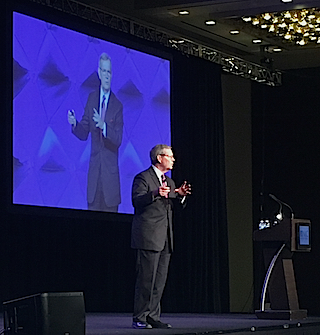
As healthcare payment reform continues, insurers will try to commoditize senior care providers, former Utah Gov. Michael Leavitt, founder and chairman of Leavitt Partners, told those attending the opening session of the National Investment Center for Seniors Housing & Care fall conference on Thursday.
“You have unique insight into this area, and you have unique assets, and I think as an industry you ought to be thinking about what role you want to play,” said Leavitt, who was Environmental Protection Agency administrator and secretary of the Department of Health and Human Services under President George W. Bush. “Those who end up in the commodity box, long term, are going to face diminishing prices.”
Senior care providers, he said, have three choices in how they respond to the changing market: fight and die, go along and have a chance, or lead and prosper. “Let’s pay attention and let’s lead so we can prosper,” he said.
Assisted living operators that don’t want to be thought of as commodities must think of residents and other decision-makers at all times, Sage Senior Living Founder and President Kelly Cook Andress said during a subsequent session at the meeting.
“I always say at my communities, ‘Would Carol Burnett live here?’ No? So make another decision,” she said. And remember that older adults continue to want to learn, Andress added.
“I was nodding the whole conversation of the keynote speaker, but if we focus too much on the payer source, if we focus too much on the aggregators, if we stop focusing on what we do best, we will lose the lifestyle battle,” she said.
The meeting featured additional sessions and NIC Talks by Ken Dychtwald, Ph.D., founder and CEO of Age Wave; Tom X. Lee, M.D., CEO and founder of One Medical Group; and former tennis professional Billie Jean King.
Presidential predictions were made at the lunch session that followed, with columnists David Brooks of the New York Times and E.J. Dionne of the Washington Post speaking.
Brooks predicted a Clinton election win but said that Trump has a 35% to 40% chance of being victorious in the election. Dionne said he’s 80% certain of a Clinton win because of the support she has among women. Those who abstain from voting or vote for a third-party candidate could spell trouble for her ballot tally, however, he added.
Dionne forecast that the government will try to reduce the labor supply to drive up wages. Brooks said that if Republicans win, they’ll push for a shift in immigration that favors educated, high-skilled immigrants over low-skilled immigrants, which could be problematic for businesses hoping to solve low-level staffing issues with immigrants.
The afternoon wrapped up with additional sessions.
The meeting ends Friday after two additional sessions and another round of NIC Talks.



